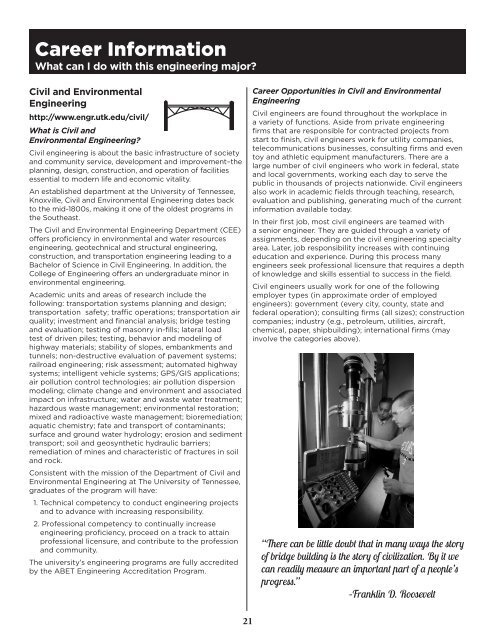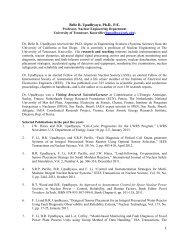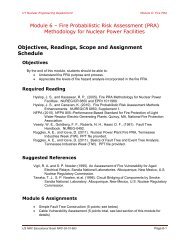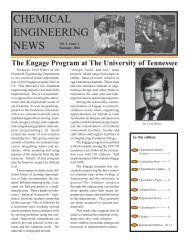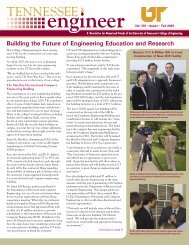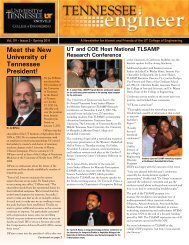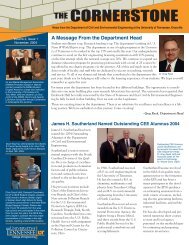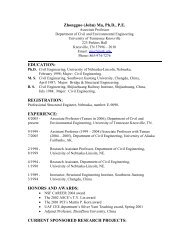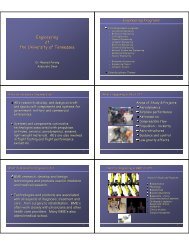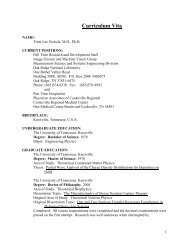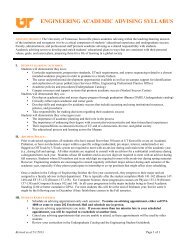Student Guidebook 2012 (PDF) - College of Engineering - The ...
Student Guidebook 2012 (PDF) - College of Engineering - The ...
Student Guidebook 2012 (PDF) - College of Engineering - The ...
You also want an ePaper? Increase the reach of your titles
YUMPU automatically turns print PDFs into web optimized ePapers that Google loves.
Career InformationWhat can I do with this engineering major?Civil and Environmental<strong>Engineering</strong>http://www.engr.utk.edu/civil/What is Civil andEnvironmental <strong>Engineering</strong>?Civil engineering is about the basic infrastructure <strong>of</strong> societyplanning, design, construction, and operation <strong>of</strong> facilitiesessential to modern life and economic vitality.An established department at the University <strong>of</strong> Tennessee,Knoxville, Civil and Environmental <strong>Engineering</strong> dates backto the mid-1800s, making it one <strong>of</strong> the oldest programs inthe Southeast.<strong>The</strong> Civil and Environmental <strong>Engineering</strong> Department (CEE)<strong>of</strong>fers pr<strong>of</strong>iciency in environmental and water resourcesengineering, geotechnical and structural engineering,construction, and transportation engineering leading to aBachelor <strong>of</strong> Science in Civil <strong>Engineering</strong>. In addition, the<strong>College</strong> <strong>of</strong> <strong>Engineering</strong> <strong>of</strong>fers an undergraduate minor inenvironmental engineering.Academic units and areas <strong>of</strong> research include thefollowing: transportation systems planning and design;transportation safety; traffic operations; transportation airquality; investment and financial analysis; bridge testingand evaluation; testing <strong>of</strong> masonry in-fills; lateral loadtest <strong>of</strong> driven piles; testing, behavior and modeling <strong>of</strong>highway materials; stability <strong>of</strong> slopes, embankments andtunnels; non-destructive evaluation <strong>of</strong> pavement systems;railroad engineering; risk assessment; automated highwaysystems; intelligent vehicle systems; GPS/GIS applications;air pollution control technologies; air pollution dispersionmodeling; climate change and environment and associatedimpact on infrastructure; water and waste water treatment;hazardous waste management; environmental restoration;mixed and radioactive waste management; bioremediation;aquatic chemistry; fate and transport <strong>of</strong> contaminants;surface and ground water hydrology; erosion and sedimenttransport; soil and geosynthetic hydraulic barriers;remediation <strong>of</strong> mines and characteristic <strong>of</strong> fractures in soiland rock.Consistent with the mission <strong>of</strong> the Department <strong>of</strong> Civil andEnvironmental <strong>Engineering</strong> at <strong>The</strong> University <strong>of</strong> Tennessee,graduates <strong>of</strong> the program will have:1. Technical competency to conduct engineering projectsand to advance with increasing responsibility.2. Pr<strong>of</strong>essional competency to continually increaseengineering pr<strong>of</strong>iciency, proceed on a track to attainpr<strong>of</strong>essional licensure, and contribute to the pr<strong>of</strong>essionand community.<strong>The</strong> university’s engineering programs are fully accreditedby the ABET <strong>Engineering</strong> Accreditation Program.Career Opportunities in Civil and Environmental<strong>Engineering</strong>Civil engineers are found throughout the workplace ina variety <strong>of</strong> functions. Aside from private engineeringfirms that are responsible for contracted projects fromstart to finish, civil engineers work for utility companies,telecommunications businesses, consulting firms and eventoy and athletic equipment manufacturers. <strong>The</strong>re are alarge number <strong>of</strong> civil engineers who work in federal, stateand local governments, working each day to serve thepublic in thousands <strong>of</strong> projects nationwide. Civil engineersalso work in academic fields through teaching, research,evaluation and publishing, generating much <strong>of</strong> the currentinformation available today.In their first job, most civil engineers are teamed witha senior engineer. <strong>The</strong>y are guided through a variety <strong>of</strong>assignments, depending on the civil engineering specialtyarea. Later, job responsibility increases with continuingeducation and experience. During this process manyengineers seek pr<strong>of</strong>essional licensure that requires a depth<strong>of</strong> knowledge and skills essential to success in the field.Civil engineers usually work for one <strong>of</strong> the followingemployer types (in approximate order <strong>of</strong> employedengineers): government (every city, county, state andfederal operation); consulting firms (all sizes); constructioncompanies; industry (e.g., petroleum, utilities, aircraft,chemical, paper, shipbuilding); international firms (mayinvolve the categories above).“<strong>The</strong>re can be little doubt that in many ways the story<strong>of</strong> bridge building is the story <strong>of</strong> civilization. By it wecan readily measure an important part <strong>of</strong> a people’sprogress.”–Franklin D. Roosevelt21


